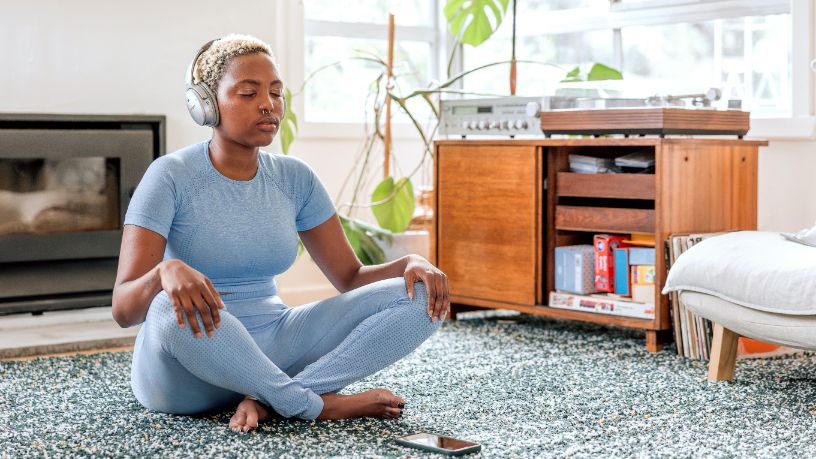On this page
Key takeaways
- Journaling can reduce stress, boost mood, and support overall mental health.
- Just a few minutes of writing each day is enough to feel the benefits.
- You can journal with pen and paper or use digital tools and apps.
Over recent years, different types of mindfulness practice have gained popularity due to their mental and physical health benefits.
Mindfulness was once seen as purely about meditation, but today it’s understood as any practice that helps calm your mind, focus your thoughts, and give both your body and mind a break from daily stress and worries.
One of the most popular and potentially beneficial forms of mindfulness is journaling.
Explore the benefits of keeping a journal, how to journal and ways to support this healthy new habit.
What is journaling?
More than simply keeping a diary, Lifeline Australia describes journaling as “like hitting the pause button on life's chaos”.1
Writing down your thoughts and feelings can provide a sense of control that having thoughts swirling in your head rarely does. Because writing takes time and focus, journaling also helps you slow down and allows time to process what you want and need.
And much like talking therapy, journaling allows you to externalise your worries and separate yourself from what might be causing stress or worry.
“Journaling can help us organise our thoughts, which can help in stress management and decision-making,” says Rachael Kable, mindfulness coach and host of The Mindful Kind podcast.
How can journaling improve our mental health?
Research studies have shown that regular journaling may provide many mental health benefits. These can include:2
- A reduction in depression and anxiety symptoms
- Trauma recovery
- Greater ability to separate thoughts from facts
- Improved stress management and resilience
Regular journaling has also been found to be supportive in substance use disorder recovery.3
[Leanne Hall, therapist and mind and body expert sits at a desk with a bookshelf behind her]
[Text on screen: How (and why) to start a journal, for non-journalers]
Leanne: Did you have a diary back in the day? You know, Dear diary, today at school...
If so, you were seriously ahead of your time. Putting pen to paper might sound a bit old-school but let me tell you why it's important for modern busy lives just like yours.
Journaling is thought to boost our emotional and mental health.
Put simply, it helps us make sense of our thoughts, giving us clarity by reflecting in a way that we just can't get from binge watching our favourite TV show. Guilty.
But how does writing do that? Well, it helps us identify our patterns and triggers, enabling us to sort of track our mood by putting some distance between us and our thoughts, making us the observer of them.
This helps unlock creativity, upgrades our problem-solving skills, and can be incredibly empowering, especially for those of us with mental health conditions such as anxiety.
Now, the thing I love about it is that journaling is just for you. No one ever needs to see it, and because it's just for you, there are no rules. A journal doesn't even have to be words.
Be creative. Try art journaling, where you can paint, draw, and use pictures to map out your thoughts and feelings. Because sometimes we just don't have the words, right?
Here's how you do it. Grab a pen, carve out some alone time, and somewhere quiet. Write or draw anything that comes to mind.
It could be single words, or it could be full sentences, streams of consciousness, or even just doodles.
The aim is to get what's in your head onto paper. Simple, right? Give it a go. You might just surprise yourself and become a journaler after all.
How to start journaling
Like any other mindfulness practice, journaling can take some time to get used to and develop as a regular practice. The good news is that you don’t need any expensive equipment to get started, and you can do it almost anywhere, anytime.
You also don’t need to spend hours writing every day to start feeling the benefits, says Kable, who suggests just several minutes a day of journaling may help you improve your mental health and stay on top of your goals.
Create a new habit
Use what you have
Start small
Use dot points
Journaling apps
If you’re simply not a pen-and-paper type of person but would still like to get the benefits of journaling, there’s no reason you can’t keep a digital journal.
Whether you save a file on your computer or use Notes on your phone, following the same rules of setting aside a time each day to record your thoughts digitally can be just as effective. T
here are also dedicated journaling apps that can help provide structure and regular reminders so you don’t forget to log your daily thoughts.
If you do prefer an online option, be sure to save the file securely and set your save time for regular updates so you don’t lose anything you’ve written.
When to seek extra support
Journaling can be a helpful way to sort our thoughts, gain some new perspective and discover an alternative way of looking at a situation. It can also open up a way for us to start processing difficult thoughts or feelings.
If you are starting to feel overwhelmed or would like additional support for your mental wellbeing, talk to your GP, who can recommend some alternative therapies.
Free online mental health program

At Bupa, trust is everything
Our health and wellbeing information is regularly reviewed and maintained by a team of healthcare experts, to ensure its relevancy and accuracy. Everyone's health journey is unique and health outcomes vary from person to person.
This content is not a replacement for personalised and specific medical, healthcare, or other professional advice. If you have concerns about your health, see your doctor or other health professional.
1Lifeline Australia. (2025). Journaling your thoughts and feelings.
2Positive Psychology. (2018). 5 benefits of journaling for mental health.
3Krentzman, A. R., Hoeppner, S. S., Hoeppner, B. B., & Barnett, N. P. (2024). A randomized feasibility study of a positive psychology journaling intervention to support recovery from substance-use disorders. Journal of Substance Use and Addiction Treatment, 164, 209410.
You might also like...
Relaxation tips for busy people
It can be hard to find time to relax when you’re busy living the nine-to-five. But 10 minutes can go a long way. Relax every day with these 7 tips.
Breathing exercises to reduce stress and anxiety
Discover easy breathing exercises to reduce stress and anxiety. Mindful breathwork can help calm your mind, boost focus, and support mental wellbeing.
Kath Ebbs: 5 self-care tips for your mental health
When it comes to your mental health, it’s important to have a solid self-care routine. Check out Kath Ebbs’ top 5 tips for getting yours on track.
Wintering: 4 rituals for the cooler months
Staying healthy and happy in the cooler months may be easier (and more restful) than you think. Check out 4 tips for doing winter well.





